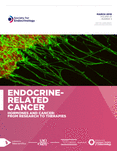Infiltration of a mixture of different immune cells may be related to molecular profile of differentiated thyroid cancer
- Lucas Leite Cunha1,
- Elaine Cristina Morari1,
- Ana Carolina Trindade Guihen1,
- Daniela Razolli2,
- Renê Gerhard3,
- Suely Nonogaki4,
- Fernando Augusto Soares5,
- José Vassallo6 and
- Laura Sterian Ward1
-
1Laboratory of Cancer Molecular Genetics, Faculty of Medical Sciences, University of Campinas (Unicamp), PO Box 6111, 126 Tessalia Vieira de Camargo Street, Campinas,
São Paulo, Brazil
2Laboratory of Cell Signaling, Faculty of Medical Sciences, University of Campinas (Unicamp), 420 Carlos Chagas Street, Campinas, São Paulo, Brazil
3Department of Radiology, Faculty of Medicine, University of São Paulo (USP), 255 Dr Enéas de Carvalho Aguiar Avenue, São Paulo, Brazil
4Adolfo Lutz Institute, 355 Doutor Arnaldo Avenue, São Paulo, Brazil
5Department of Pathology, A. C. Camargo Cancer Hospital, 211 Antonio Prudente Street, São Paulo, São Paulo, Brazil
6Laboratory of Investigative and Molecular Pathology (Ciped), Faculty of Medical Sciences, University of Campinas (Unicamp), 126 Tessalia Vieira de Camargo Street, Campinas, São Paulo, Brazil
- (Correspondence should be addressed to L S Ward; Email: ward{at}fcm.unicamp.br)
Dear Editor
Pathologists have long recognized that some tumors are densely infiltrated by cells of both innate and adaptive arms of the immune system, thereby reflecting inflammatory conditions arising in non-neoplastic tissues (Dvorak 1986, Hanahan & Weinberg 2011). Such infiltration may reflect an effort of the immune system attempting to eradicate neoplastic cells. Conversely, there is an increasing amount of evidences for antitumor responses, resulting from a pressure on the tumor to evade immune destruction (Hanahan & Weinberg 2011). Tumor evolution and consequent patient outcomes may depend on this complex interaction between immune system and tumor cells.
The immune responses against differentiated thyroid carcinomas (DTC) have also been extensively studied (Modi et al. 2003). CD4+T cells are central to the successful orchestration of this immune response. Naive CD4+T cells differentiate into one of at least four functionally distinct fates, such as Th1, Th2, Th17, and regulatory T cells (Tregs). In general, Tregs are identified as FOXP3+ lymphocytes and are thought to contribute to tumor-specific T-cell tolerance (Zhou & Levitsky 2007). Th17 cells were recently described but, despite their important role in host protection against infectious pathogens and in the pathogenesis of various inflammatory and autoimmune diseases, their prevalence in human cancer is still under investigation (Su et al. 2010).
Antitumor immune response is thought to be related to tumor antigenicity. In fact, a correlation between the protein expression profile and immune cell infiltration in DTC was observed (Bruland et al. 2009). Some researchers have suggested that MUC1, NIS (SLC5A5), ATM, PTEN, and CD56 (NCAM1) expression might indicate tumor differentiation and tumor progression, demonstrating tumor antigenicity (Larson et al. 2007, El Demellawy et al. 2008, Morari et al. 2010). However, whether these markers are really associated with DTC immune response is still not …












